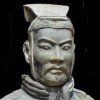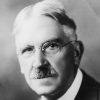Do not worry about what others are doing. Each of us should turn the searchlight inward and purify his or her own heart as much as possible.
Mohandas Gandhi (1869-1948) Indian philosopher and nationalist [Mahatma Gandhi]
Speech, All-India Radio (1948-01-16)
(Source)
Two weeks before his death. In Louis Fischer, The Life of Mahatma Gandhi, Part 3, ch. 9 "The Last Fast" (1957).
Quotations about:
self-awareness
Note not all quotations have been tagged, so Search may find additional quotes on this topic.
For such is the nature of men that howsoever they may acknowledge many others to be more witty, or more eloquent or more learned, yet they will hardly believe there be many so wise as themselves; for they see their own wit at hand, and other men’s at a distance.
Whose house is of glasse, must not throw stones at another.
George Herbert (1593-1633) Welsh priest, orator, poet.
Jacula Prudentum, or Outlandish Proverbs, Sentences, &c. (compiler), # 196 (1640 ed.)
(Source)
Today usually phrased, "People who live in glass houses shouldn't throw stones."
Strive to be patient; bear with the faults and frailties of others, for you, too, have many faults which others have to bear. If you cannot mould yourself as you would wish, how can you expect other people to be entirely to your liking?
[Stude patiens esse in tolerando aliorum defectus, et qualescumque infirmitates, quia et tu multa habes, quæ ab aliis oportet tolerari. Si non potes te talem facere qualem vis, quomodo poteris alium habere ad beneplacitum tuum?]
Thomas à Kempis (c. 1380-1471) German-Dutch priest, author
The Imitation of Christ [De Imitatione Christi], Book 1, ch. 16, v. 2 (1.16.2) (c. 1418-27) [tr. Sherley-Price (1952)]
(Source)
(Source (Latin)). Alternate translations:
Study always that thou mayest be patient in suffering of other men’s defaults, for thou hast many things in thee that others do suffer of thee: and if thou canst not make thyself to be as thou wouldst, how mayest thou then look to have another to be ordered in all things after thy will?
[tr. Whitford/Raynal (1530/1871)]
Study always to be patient in bearing other men's defects, for you have many in yourself that others suffer from you, and if you cannot make yourself be as you would, how may you then look to have another regulated in all things to suit your will?
[tr. Whitford/Gardiner (1530/1955)]
Endeavour thy selfe patiently to bear with any faults and infirmities of others, for that thou thy selfe hast many things that must be borne withall by others. If thou canst not make thy selfe such a one as thou wouldst be, how canst thou expect to have another to thy liking in all things?
[tr. Page (1639), 1.16.6-7]
Remember, that You also have many Failings of your own, by which the Patience of other People will have its turn of being exercised. And if you do (as certainly you cannot but) see this, think how unreasonable it is, to expect you should make others in all particulars, what you would have them to be; when you cannot so much as make your self, what you are sensible you ought to be.
[tr. Stanhope (1696; 1706 ed.)]
Endeavor, to be always patient of the faults and imperfections of others; for thou haft many faults and imperfections of thy own, that require a reciprocation of forbearance. If thou art not able to make thyself that which thou wishest to be, how canst thou expect to mould another in conformity to thy will?
[tr. Payne (1803), 1.16.3]
Endeavour to be patient in bearing with the defects and infirmities of others, of what sort soever they be; for that thyself also hast many [failings] which must be borne with by others. If thou canst not make thyself such an one as thou wouldest, how canst thou expect to have another in all things to thy liking?
[ed. Parker (1841)]
Endeavour to be always patient of the faults and imperfections of others, whatever they may be; for thou hast many faults and imperfection of thy own, that require forbearance from others. If thou art not able to make thyself that which thou wishest to be, how canst thou expect to mould another in conformity to thy will?
[tr. Dibdin (1851)]
Endeavour to be patient in bearing with defects and infirmities in others, of what kind soever; because thou also hast many things which others must bear with. If thou canst not make thyself such as thou wouldst, how canst thou expect to have another according to thy liking?
[ed. Bagster (1860)]
Endeavour to be patient in bearing with other men’s faults and infirmities whatsoever they be, for thou thyself also hast many things which have need to be borne with by others. If thou canst not make thine own self what thou desireth, how shalt thou be able to fashion another to thine own liking.
[tr. Benham (1874)]
Endeavour to be patient in bearing with the defects and infirmities of others, of what sort soever they be; for that thyself also hast many failings which must be borne with by others. If thou canst not make thyself such an one as thou wouldst, how canst thou expect to have another in all things to thy liking?
[tr. Anon. (1901)]
Try to bear patiently with the defects and infirmities of others, whatever they may be, because you also have many a fault which others must endure. If you cannot make yourself what you would wish to be, how can you bend others to your will?
[tr. Croft/Bolton (1940)]
Try to be patient in bearing with others’ failings and all kinds of weaknesses, for you too have many which must be put up with by others. If you cannot mould yourself exactly as you would, how can you get another to be satisfying to you?
[tr. Daplyn (1952)]
Yes, you do well to cultivate patience in putting up with the shortcomings, the various disabilities of other people; only think how much they have to put up with in you! When you make such a failure of organizing your own life, how can you expect everybody else to come up to your own standards?
[tr. Knox-Oakley (1959)]
Try to be patient in bearing with the failings and weaknesses of other people, whatever they may be. You too have many faults, which others have to endure. If you cannot make yourself the kind of person you wish, how can you expect to have someone else to your liking?
[tr. Knott (1962)]
Seek always to be tolerant of the shortcomings and failings of others. They also have much to tolerate in you. If you are unable to mould yourself as you wish, how can you expect others to conform to your liking?
[tr. Rooney (1979)]
Take pains to be patient in bearing all the faults and weaknesses of others, for you too have many flaws that others must put up with. If you cannot make yourself as you would like to be, how can you expect to have another person entirely to your liking?
[tr. Creasy (1989)]
For it is the characteristic of folly, to have eyes for the faults of others, and blindness for its own.
[Est enim proprium stultitiae aliorum vitia cernere, oblivisci suorum.]
Marcus Tullius Cicero (106-43 BC) Roman orator, statesman, philosopher
Tusculan Disputations [Tusculanae Disputationes], Book 3, ch. 30 (3.30) / sec. 73 (45 BC) [tr. Otis (1839)]
(Source)
(Source (Latin)). Alternate translations:
For it is the property of Folly, to look upon other mens Failings, and to forget their own.
[tr. Wase (1643)]
For it is the peculiar characteristic of folly to discover the vices of others, forgetting its own.
[tr. Main (1824)]
For it is the peculiar characteristic of folly to perceive the vices of others, but to forget its own.
[tr. Yonge (1853)]
It is the peculiar quality of a fool to perceive the faults of others and to forget his own.
[Source (1882)]
It is the property of folly to see the faults of others, to forget its own.
[tr. Peabody (1886)]
This is just how foolish people behave: they observe the faults of others and forget their own.
[tr. Graver (2002)]
It is a trait of fools to perceive the faults of others but not their own.
Anyone who takes himself too seriously always runs the risk of looking ridiculous; anyone who can consistently laugh at himself does not.
Václav Havel (1936-2011) Czech playwright, essayist, dissident, politician
Disturbing the Peace, ch. 2 “Writing for the Stage” (1986) [tr. Wilson (1990)]
(Source)
Know the enemy, know yourself; in a hundred battles you will not be in peril.
Sun-Tzu (fl. 6th C. AD) Chinese general and philosopher [a.k.a. Sun Wu]
The Art of War, “Offensive Strategy” (31) [tr. S. Griffith (1963)]
Alt trans:
- "It is said that if you know your enemies and know yourself, you will not be imperiled in a hundred battles; if you do not know your enemies but do know yourself, you will win one and lose one; if you do not know your enemies nor yourself, you will be imperiled in every single battle." [cited ch. 3, last sentence.]
- "If you know others and know yourself, you will not be imperiled in a hundred battles; if you do not know others but know yourself, you win one and lose one; if you do not know others and do not know yourself, you will be imperiled in every single battle."
- "Know your enemy and know yourself, find naught in fear for 100 battles. Know yourself but not your enemy, find level of loss and victory. Know thy enemy but not yourself, wallow in defeat every time."
- "If you know the enemy and know yourself, you need not fear the result of a hundred battles. If you know yourself but not the enemy, for every victory gained you will also suffer a defeat. If you know neither the enemy nor yourself, you will succumb in every battle."
- Literal translation: "Know [the] other, know [the] self, hundred battles without danger; not knowing [the] other but know [the] self, one win one loss; not knowing [the] other, not knowing [the] self, every battle must [be] lost."
If we should hear it reported of the Eastern People, that their usual Drink is a Liquor which flies up into the Head, makes them mad, and sets them a-vomiting, we should be apt to lift up our Hands and say, These sottish Barbarians!
[Si nous entendions dire des Orientaux qu’ils boivent ordinairement d’une liqueur qui leur monte à la tête, leur fait perdre la raison et les fait vomir, nous dirions: «Cela est bien barbare.»]
Jean de La Bruyère (1645-1696) French essayist, moralist
The Characters [Les Caractères], ch. 12 “Of Opinions [Des Jugements],” § 24 (12.24) (1688) [Browne ed. (1752)]
(Source)
(Source (French)). Alternate translations:
If we should talk of the Eastern People, how they ordinarily drink a Liquor that takes the head, makes them mad, and forces them to vomit, we should be apt to say 'tis Barbarous.
[Bullord ed. (1696)]
If we should hear it reported of the Eastern People, how they ordinarily drink a Liquor which flies up into the Head, makes them mad, and forces them to vomit, we should be apt to say, this is very Barbarous.
[Curll ed. (1713)]
If we should hear it reported of an Eastern nation that they habitually drink a liquor which flies to their head, drives them mad, and makes them very sick, we should say they are barbarians.
[tr. Van Laun (1885)]
If we heard it said of Orientals that they habitually drank a liquor which went to their heads, deprived them of reason, and made them vomit, we should say: “How very barbarous!”
[tr. Stewart (1970)]
LONDO: There comes a time when you look into the mirror, and you realize that what you see is all that you will ever be. Then you accept it, or you kill yourself. Or you stop looking into mirrors.
“I beseech ye in the bowels of Christ, think that ye may be mistaken.” I should like to have that written over the portals of every church, every school, and every court house, and, may I say, of every legislative body in the United States. I should like to have every court begin, “I beseech ye in the bowels of Christ, think that we may be mistaken.”
Learned Hand (1872-1961) American jurist
Testimony, US Senate Committee on Labor and Public Welfare, Special Subcommittee on the Establishment of a Commission on Ethics in Government (1951-06-28)
(Source)
This was a favorite phrase of Hand's regarding his own judicial philosophy. Quoting Oliver Cromwell's letter to the General Assembly of the Church of Scotland (Aug 1650) before the Battle of Dunbar.
Collected as "Morals in Public Life" in Irving Dillard, ed., The Spirit of Liberty (1952).
TOUCHSTONE: I do now remember a saying, “The fool doth think he is wise, but the wise man knows himself to be a fool.”
William Shakespeare (1564-1616) English dramatist and poet
As You Like It, Act 5, sc. 1, l. 30ff (5.1.30-32) (1599)
(Source)
POLONIUS: This above all: to thine own self be true,
And it must follow, as the night the day,
Thou canst not then be false to any man.William Shakespeare (1564-1616) English dramatist and poet
Hamlet, Act 1, sc. 3, l. 84ff (1.3.84-86) (c. 1600)
(Source)
I have found that the greatest help in meeting any problem with decency and self-respect and whatever courage is demanded, is to know where you yourself stand. That is, to have in words what you believe and are acting from.
William Faulkner (1897-1962) American novelist
Letter to David Kirk, Oxford, Miss. (8 Mar 1956)
(Source)
We are never quite as happy, or as unhappy, as we think.
[On n’est jamais si heureux ni si malheureux qu’on s’imagine.]
François VI, duc de La Rochefoucauld (1613-1680) French epigrammatist, memoirist, noble
Réflexions ou sentences et maximes morales [Reflections; or Sentences and Moral Maxims], ¶49 (1665-1678) [tr. FitzGibbon (1957)]
(Source)
Present in the first edition. In the first four editions, the concluding words were "... que l’on pense [whatever one thinks]." In the manuscript, this maxim read:
One is never so unhappy as one fears, nor so happy as one hopes.
[On n’est jamais si malheureux qu’on craint, ni si heureux qu’on espère.]
Another manuscript version is what the Davies translation below derives from:
Les biens et les maux sont plus grands dans notre imagination qu’ils ne le sont en effet, et on n’est jamais si heureux ni si malheureux que l’on pense.
Above notes. (Source (French)). Alternate translations:
Goods and Evils are much greater in our imaginations of them, than they are in effect; and men are never so happy or unhappy, as they think themselves.
[tr. Davies (1669), ¶128; see above.]
None are either so happy or so unhappy, as they imagine.
[pub. Donaldson (1783), ¶211; ed. Lepoittevin-Lacroix (1797), ¶49]
No person is either so happy;, or so unhappy, as he imagines.
[ed. Carville (1835), ¶184]
We are never so happy, or so unhappy, as we imagine.
[ed. Gowens (1851), ¶50]
We are never so happy or so unhappy as we suppose.
[tr. Bund/Friswell (1871); tr. Stevens (1939)]
We are never as happy or unhappy as we think.
[tr. Heard (1917)]
We are never so happy or so unhappy as we think.
[tr. Kronenberger (1959)]
We are never as fortunate or as unfortunate as we suppose.
[tr. Tancock (1959)]
We are never so happy nor so unhappy as we imagine.
[tr. Whichello (2016)]
Men go forth to marvel at the heights of mountains and the huge waves of the sea, the broad flow of the rivers, the vastness of the ocean, the orbits of the stars, and yet they neglect to marvel at themselves.
[Et eunt homines mirari alta montium et ingentes fluctus maris et latissimos lapsus fluminum et oceani ambitum et gyros siderum, et relinquunt se ipsos.]
Augustine of Hippo (354-430) Christian church father, philosopher, saint [b. Aurelius Augustinus]
Confessions, Book 10, ch. 8 / ¶ 15 (10.8.15) (c. AD 398) [tr. Outler (1955)]
(Source)
(Source (Latin)). Alternate translations:
And men go abroad to admire the heights of mountains, the mighty billows of the sea, the broad tides of rivers, the compass of the ocean, and the circuits of the stars, and pass themselves by.
[tr. Pusey (1838)]
And men go forth to wonder at the heights of mountains, the huge waves of the sea, the broad flow of the rivers, the extent of the ocean, and the courses of the stars, and omit to wonder at themselves.
[tr. Pilkington (1876)]
And men travel to admire the heights of mountains, and the vast waves of the sea, and the broad streams of rivers, and the circuit of the ocean, and the orbits of stars, and pass over themselves.
[tr. Hutchings (1890)]
Here are men going afar to marvel at the heights of mountains, the mighty waves of the sea, the long courses of great rivers, the vastness of the ocean, the movements of the stars, yet leaving themselves unnoticed.
[tr. Sheed (1943)]
Men go forth to marvel at the mountain heights, at huge waves in the sea, at the broad expanse of flowing rivers, at the wide reaches of the ocean, and at the circuits of the stars, but themselves they pass by.
[tr. Ryan (1960)]
Yet men go out and gaze in astonishment at high mountains, the huge waves of the sea, the broad reaches of rivers, the ocean that encircles the world, or the stars in their courses. But they pay no attention to themselves.
[tr. Pine-Coffin (1961)]
And men go abroad to wonder at the heights of mountains, the huge waves of the sea, the broad streams of rivers, the vastness of the ocean, the turnings of the stars -- and they do not notice themselves.
[tr. Warner (1963)]
Men go to wonder at the heights of mountains, and the huge billows of the sea, the broad sweeps of the rivers, the curve of ocean and the circuits of the stars, and yet pass by themselves.
[tr. Blaiklock (1983)]
EDUCATION, n. That which discloses to the wise and disguises from the foolish their lack of understanding.
Ambrose Bierce (1842-1914?) American writer and journalist
“Education,” The Cynic’s Word Book (1906)
(Source)
Included in The Devil's Dictionary (1911). Originally published in the "Devil's Dictionary" column in the San Francisco Wasp (1882-12-23).
We judge ourselves by what we feel capable of doing, while others judge us by what we have already done.
Many would be wise if they did not think themselves wise.
[Serían sabios algunos si no creyesen que lo son.]
Baltasar Gracián y Morales (1601-1658) Spanish Jesuit priest, writer, philosopher
The Art of Worldly Wisdom [Oráculo Manual y Arte de Prudencia], § 176 (1647) [tr. Jacobs (1892)]
(Source)
(Source (Spanish)). Alternate translations:
Some would be wise, if they did not think themselves so.
[Flesher ed. (1685)]
Some would be wise if they did not believe themselves wise.
[tr. Fischer (1937)]
Some would be sages if they did not believe they were so already.
[tr. Maurer (1992)]
When you see someone who is worthy, concentrate upon becoming their equal; when you see someone who is unworthy, use this as an opportunity to look within yourself.
[見賢思齊焉、見不賢而內自省也。]
Confucius (c. 551- c. 479 BC) Chinese philosopher, sage, politician [孔夫子 (Kǒng Fūzǐ, K'ung Fu-tzu, K'ung Fu Tse), 孔子 (Kǒngzǐ, Chungni), 孔丘 (Kǒng Qiū, K'ung Ch'iu)]
The Analects [論語, 论语, Lúnyǔ], Book 4, verse 17 (4.17) (6th C. BC – AD 3rd C.) [tr. Slingerland (2003)]
(Source)
(Source (Chinese)). Alternate translations:
When we see men of worth, we should think of equaling them; when we see men of a contrary character, we should turn inwards and examine ourselves.
[tr. Legge (1861)]
When you meet with men of worth, think how you may attain to their level; when you see others of an opposite character, examine yourself.
[tr. Jennings (1895)]
When we meet with men of worth, we should think how we may equal them. When we meet with worthless men, we should turn into ourselves and find out if we do not resemble them.
[tr. Ku Hung-Ming (1898)]
When you see a man of worth, think how to rise to his level. When you see an unworthy man, then look within and examine yourself.
[tr. Soothill (1910)]
See solid talent and think of measuring up to it; see the un-solid and examine your own insides.
[tr. Pound (1933)]
In the presence of a good man, think all the time how you may learn to equal him. In the presence of a bad man, turn your gaze within!
[tr. Waley (1938)]
When you see a man of the highest caliber, give thought to attaining his stature. When you see one who is not, go home and conduct a self-examination.
[tr. Ware (1950)]
When you meet someone better than yourself, turn your thoughts to becoming his equal. When you meet someone not as good as you are, look within and examine your own self.
[tr. Lau (1979)]
When you come across a superior person, think of being equal to him. When you come across an inferior person, turn inwards and examine yourself.
[tr. Dawson (1993)]
When you see a worthy man, seek to emulate him. When you see an unworthy man, examine yourself.
[tr. Leys (1997)]
On seeing a worthy man, think of equalling him; on seeing an unworthy man, examine yourself inwardly.
[tr. Huang (1997)]
One should think to follow the sagaciousness when one sees it; One should examine onceself when one sees the no sagaciousness.
[tr. Cai/Yu (1998), #83]
When you meet persons of exceptional character think to stand shoulder to shoulder with them; meeting persons of little character, look inward and examine yourself.
[tr. Ames/Rosemont (1998)]
When he sees a worthy man, let him think how he might come up to him; when he sees an unworthy man, let him examine within himself.
[tr. Brooks/Brooks (1998)]
In the presence of sages, you can see how to perfect your thoughts. In the presence of folls, you must awaken yourself.
[tr. Hinton (1998)]
When you see a worthy person, think about how you can equal him. When you see an unworthy person, reflect on your own conduct.
[tr. Watson (2007)]
When you meet a worthy person, think how you could become his equal. When you meet an unworthy person, turn inward and examine your own conduct.
[tr. Chin (2014)]
When you meet a virtuous person, you should strive to emulate his virtues. When you meet a person void of virtue, you should consider whether you have the same flaws.
[tr. Li (2020)]
No individual or group will be judged by whether they come up to or fall short of some fixed result, but by the direction in which they are moving. The band mans is the man who no matter how good he has been is beginning to deteriorate, to grow less good. The good man in the man who no matter how morally unworthy he has been is moving to become better. Such a conception makes one severe in judging himself and humane in judging others.
John Dewey (1859-1952) American teacher and philosopher
Reconstruction in Philosophy, ch. 7 “Moral Reconstruction” (1919)
(Source)
OPHELIA: Lord, we know what we are but know not what we may be.
William Shakespeare (1564-1616) English dramatist and poet
Hamlet, Act 4, sc. 5, l. 48ff (4.5.48-49) (c. 1600)
(Source)
There are many humorous things in the world, among them the white man’s notion that he is less savage than the other savages.
Mark Twain (1835-1910) American writer [pseud. of Samuel Clemens]
Following the Equator, ch. 21 (1897)
(Source)
O wad some Pow’r the giftie gie us
To see oursels as others see us!
It wad frae mony a blunder free us,
An’ foolish notion ….Robert Burns (1759-1796) Scottish national poet
“To a Louse,” l.43-46 (1786)
The poem is reprinted in various forms and anglicizations of Burns' Scottish, e.g.,O wad some Power the giftie gie us
To see oursels as ithers see us!
It wad frae monie a blunder free us
An foolish notionO would some Power the gift to give us
To see ourselves as others see us!
It would from many a blunder free us,
And foolish notion:
You should each judge your own conduct. If it is good, then you can be proud of what you yourself have done, without having to compare it with what someone else has done. For each of you have to carry your own load.
The Bible (The New Testament) (AD 1st - 2nd C) Christian sacred scripture
Galatians 6:4-5 [GNT (1976)]
(Source)
Alternate translations:
But let every man prove his own work, and then shall he have rejoicing in himself alone, and not in another.
For every man shall bear his own burden.
[KJV (1611)]
Let each of you examine his own conduct; if you find anything to boast about, it will at least be something of your own, not just something better than your neighbour has. Everyone has his own burden to carry.
[JB (1966)]
But everyone is to examine his own achievements, and then he will confine his boasting to his own achievements, not comparing them with anybody else's. Each one has his own load to carry.
[NJB (1985)]
Each person should test their own work and be happy with doing a good job and not compare themselves with others. Each person will have to carry their own load.
[CEB (2011)]
All must test their own work; then that work, rather than their neighbor’s work, will become a cause for pride. For all must carry their own loads.
[NRSV (2021 ed.)]
Everyone should be prepared at times to re-examine the foundations of their beliefs, to view the world from others’ perspectives, and to seriously consider the possibility that what they accept as the Absolute Truth may, in fact, not be true at all — except me, of course, because I know I’m right.
Everyone complains of his memory, but no one complains of his judgment.
[Tout le monde se plaint de sa mémoire, et personne ne se plaint de son jugement.]François VI, duc de La Rochefoucauld (1613-1680) French epigrammatist, memoirist, noble
Réflexions ou sentences et maximes morales [Reflections; or Sentences and Moral Maxims], ¶89 (1665-1678)
First appeared in the 2nd (1666) edition. The written manuscript adds "because everyone believes they have a lot of it."
(Source (French)). Alternate translations:
Every body complains for want of Memory; but you never find any body complain of the Weakness of his Judgment.
[tr. Stanhope (1694), ¶90]
Every one complains of the badness of his memory, but nobody of his judgment.
[pub. Donaldson (1783), ¶263; ed. Lepoittevin-Lacroix (1797), ¶86]
Of the want of memory every one complains;, but nobody of the want of judgment.
[ed. Carvill (1835), ¶263]
Every one complains of his memory, and no one complains of his judgment.
[ed. Gowens (1851), ¶92]
Everyone blames his memory, no one blames his judgment.
[tr. Bund/Friswell (1871), ¶89]
Everyone blames his memory, no one his judgment.
[tr. Heard (1917), ¶89]
Everyone finds fault with his memory, but none with his judgement.
[tr. Stevens (1939), ¶89]
Everyone complains of his memory, none of his judgment.
[tr. FitzGibbon (1957), ¶89]
Everyone complains of his memory and no one complains of his judgment.
[tr. Kronenberger (1959), ¶89]
Everybody complains of his memory, but nobody of his judgment.
[tr. Tancock (1959), ¶89]
Everybody complains of his memory; but when did you ever hear anybody complain about his judgement?
[tr. Whichello (2016), ¶89]































